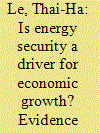| Srl | Item |
| 1 |
ID:
167435


|
|
|
|
|
| Summary/Abstract |
Oil wealth tends to impede democracy, but scholars disagree about both why and under what conditions. This note helps answer these questions by evaluating the field's foundational theory of the rentier state, which claims that oil wealth finances generous societal benefits that reduce citizens’ demands for representation and hinder the emergence of democratic regimes. I create a new measure of such benefits, focusing specifically on the size of domestic gasoline subsidies in dollars per capita. I then use a global sample from 1990 through 2014 to demonstrate that greater spending on these subsidies significantly reduces the likelihood of a transition toward democracy. The impact on democratization is as consequential in practical terms as are large increases in the rate of economic growth. Moreover, including the measure of fuel subsidies helps account for the autocratic effect of oil income. I conclude by highlighting how this fuel subsidy data can shed light on a number of other political economy questions.
|
|
|
|
|
|
|
|
|
|
|
|
|
|
|
|
| 2 |
ID:
166571


|
|
|
|
|
| Summary/Abstract |
This study examines whether energy security contributes to economic growth for a global sample of 74 countries covering the period from 2002 to 2013. The benchmark model is built based on an extended version of the Cobb-Douglas production function. Ten measures of energy security are employed to capture five aspects of energy security including availability, accessibility, acceptability, affordability, and develop-ability. Besides the whole sample, we also conduct the panel data analysis on subsamples of countries based on different income levels, using Panel-Corrected Standard Errors (PCSE) and Feasible Generalized Least Squares (FGLS) techniques that correct for heterogeneity and autocorrelation and produce robust standard errors. The empirical results appear to be relatively robust to these two estimation techniques. Overall, we find that energy security enhances economic growth for both the whole sample and subsamples of countries. Meanwhile, energy insecurity measured by energy intensity and carbon intensity variables has a negative impact on economic growth. The results vary across subsamples for several cases. The findings imply that at the global level, energy for economic development, energy security, and climate change mitigation should be pursued as integrated themes since there are linkages among these three agendas.
|
|
|
|
|
|
|
|
|
|
|
|
|
|
|
|